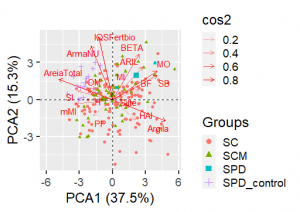 Prelecionista: Iolanda Alves dos Santos
Prelecionista: Iolanda Alves dos Santos
Data: 16/09/2022, às 14h, via Google Meet*
Orientador: Dalila Sêni Buonicontro
Resumo: Increase the global agricultural productivity to ensure food security for the growing human population is a big challenge. To overcome this challenge, sustainable practices are necessary. Soil nematodes are sensitive to human intervention and have been widely used as soil quality bioindicators in agricultural systems. In agroecosystems, there is a growing interest in the use of nematode community indices as well as soil microbial activity, determined by arylsulfatase and β-glucosidase enzymes, as indicators of soil quality changes under different management practices. This study investigated the nematode community indices, along with microbial soil enzymes activity and with physicochemical properties, for the soil quality assessment, as well as their influence on productivity. In areas under different soil management systems, the soil enzyme activity, nematode community indices and soil physicochemical properties were determined during the cotton and soybean crop cycle, season 2020/202. No-tillage systems showed higher ecological indices of maturity, modified maturity, plant parasites, enrichment, and structure. These results suggest that the no-tillage practice was beneficial to the soil microbiota. Based on the soil enzymes activity, it was not possible to identify differences between the management practices implemented in the studied areas. However, the IQS-FERBIO (Fertility and Biological Soil Quality Index), which takes into account the physical-chemical properties and enzyme activity, was higher in no-tillage system areas. In addition, it was possible to demonstrate that the omnivores trophic group, enrichment index and structure index, were related to higher productivity. Nematofauna and IQS-FERTBIO were influenced by cultivation practices, demonstrating to be important as indicators for the soil quality.
*Interessados em receber o link, favor enviar email com sua identificação para pos.fitopatologia@ufv.br.
